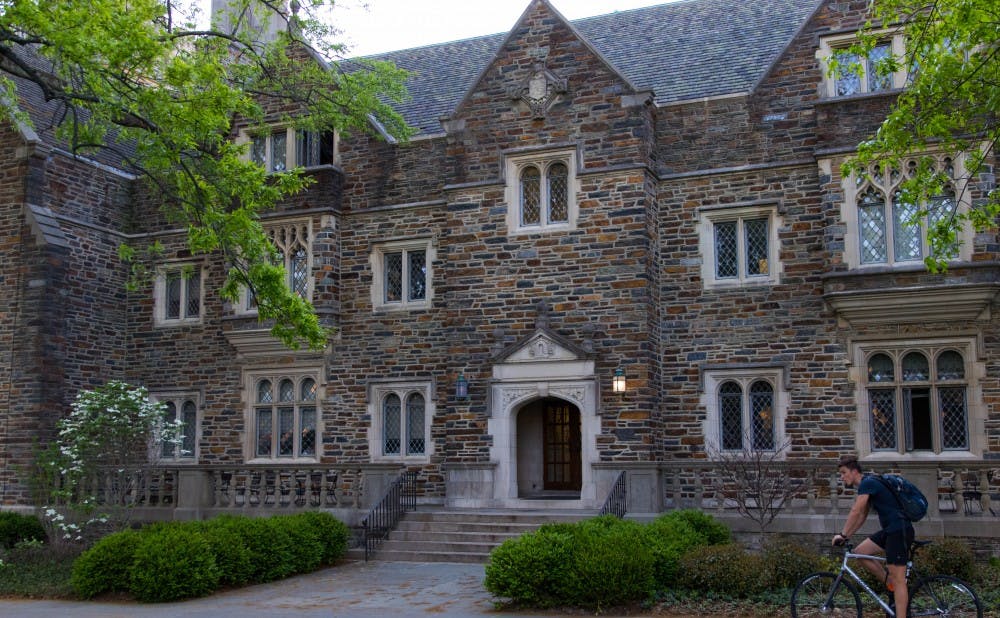Duke professor Kerry Haynie, and a member of the curriculum development committee, co-published an open letter last Wednesday rejecting claims that the College Board "stripped down" its new Advanced Placement course in African American Studies after criticism from Florida Gov. Ron DeSantis.
Haynie, professor of political science and dean of the social sciences, is one of 16 high school teachers and college professors on the AP African American Studies Development Committee. In the letter, he rejected any claims of the curriculum and the College Board “[indoctrinating] students” or “[bowing] to political pressure.” Haynie told The Chronicle that any such characterizations are “grossly inaccurate” and “misleading.”
The College Board released the official framework, which has been in development for over a year, on Feb. 1.
In the weeks leading up to the framework's release, the course has become the subject of national controversy as Gov. DeSantis, a Republican, and the Florida Department of Education stated it would not offer the course within the state after seeing a draft of the framework.
“As presented, the content of this course is inexplicably contrary to Florida law and significantly lacks educational value,” read a Jan. 12 letter from the Florida Department of Education to the College Board.
On Feb. 1, the New York Times published an article suggesting that the College Board had reworked the curriculum in response to DeSantis's critiques, stating that “after heavy criticism from Gov. Ron DeSantis, the College Board released on Wednesday an official curriculum for its new Advanced Placement course in African American Studies — stripped of much of the subject matter that had angered the governor and other conservatives.”
But Haynie and the College Board disagree with the Times’ interpretation of events.
In response to the Times, Haynie and his colleague Teresa Reed, dean of the school of music at the University of Louisville, wrote an open letter clarifying their perspective as members of the curriculum development committee.
“We’ve been concerned to see the work of more than 300 college professors caricatured and misrepresented as a political pawn,” the professors wrote.
“To be clear, despite the claims from various quarters, no state or district has yet seen these materials, let alone influenced our deliberations and decisions about what topics to include,” they added.
Haynie described the notion that College Board changed the course content in response to DeSantis’s critiques as “categorically false.”
Haynie told The Chronicle that the last time the committee made changes to the framework was on Dec. 22, 2022, before Gov. DeSantis made public comments regarding the curriculum.
The committee has met for more than a year. Haynie said that “not once, in any discussion we’ve had about any of the course content,” did Gov. DeSantis’s name come up in conversation.
DeSantis is expected to run for the Republican presidential nomination in 2024, and Haynie believes his comments are a political campaign tactic the governor is using to gain “some leverage and advantage” ahead of the GOP primary.
The College Board also characterized the New York Times piece as a “gross misrepresentation of the content of the course and the process by which it was developed” in a Feb. 1 release.
“The Times argues the revisions were made in response to Florida, despite the fact that the College Board has time-stamped records of revisions from December 22, 2022,” the release stated.
The committee’s revisions prioritized “providing a historical foundation” over “contemporary topics, and focused on assessing “depth over breadth” with assessments, according to the open letter.
These revisions include the removal of writers and scholars such as Columbia law professor Kimberlé W. Crenshaw, whose work is described as “foundational in critical race theory and in ‘intersectionality,’’ Yale professor Roderick Ferguson, who has written about queer social movements, and Ta-Nehisi Coates, a leading advocate for reparations for slavery, according to the Times.
While the Times article also questioned the ability of the course to fulfill its mission without secondary sources, the College Board’s statement noted that “no AP course… has required a list of secondary sources in their frameworks.”
Haynie described the new AP course as an opportunity for students “to expand knowledge, to create new knowledge and new understandings of how this thing we call the United States came to be and what it is.”
Get The Chronicle straight to your inbox
Sign up for our weekly newsletter. Cancel at any time.
“You cannot separate American history from African American history, and the contributions that African Americans have made, to the American story,” Haynie said.

Kathryn Thomas is a Trinity junior and new reporter coordinator of The Chronicle's 119th volume. She was previously news editor for Volume 118.

